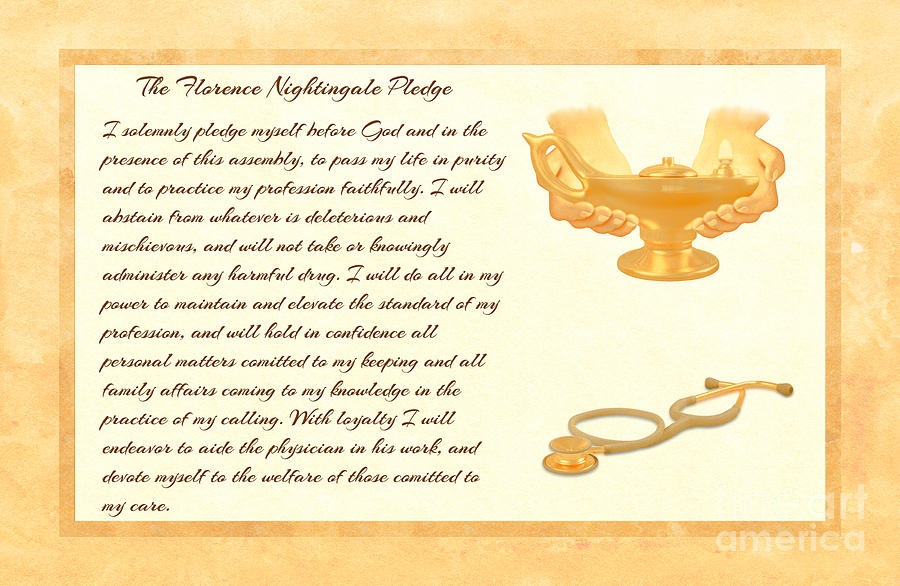

FLORENCE NIGHTINGALE PLEDGE CODE
The need for privacy and confidentiality is included in the Code for Nurses published by the Ethics Committee of the American Nurses Association. For example, nurses have long recognized the need for confidentiality even before legislation was mandated. Many aspects of the pledge are still applicable today. The pledge was meant to describe the opinions of what nurses did at the time and to shape the image of nurses. The committee was chaired by Lystra Gretter 3 and was based on the Hippocratic Oath. The pledge was actually written by a committee at the Farrand Training School for Nurses in Detroit, Michigan, in 1893. Interestingly, the pledge was not written by Florence Nightingale. With loyalty will I endeavor to aid the physician in his work, and devote myself to the welfare of those committed to my care. I will do all in my power to maintain and elevate the standard of my profession, and will hold in confidence all personal matters committed to my keeping and all family affairs coming to my knowledge in this practice of my profession. I will abstain from whatever is deleterious and mischievous, and will not take or knowingly administer any harmful drug. To pass my life in purity and to practice my profession faithfully. I solemnly pledge myself before God and in the presence of this assembly: I remember being slightly misty-eyed and beaming with pride in finally accomplishing the dreams of becoming a nurse since I was 6 years old. I will not tell you when, but suffice it occurred a few decades ago. I clearly remember reciting this pledge when I graduated from nursing school.

1 This class then wanted to discuss the Nightingale Pledge. Then with the support of many groups, the day of celebration became week to include May 12, the birthday of Florence Nightingale. After many attempts by several nursing groups, a joint resolution to celebrate National Nurses Day was made by the US Congress in 1982. This official celebration of nurses and the profession of nursing started in 1954 as a week in October to mark the 100th anniversary of Florence Nightingale's work with patients during the Crimean War. National Nurses Week is celebrated May 6 to 12 and was established by the American Nurses Association in 1990 as an extension of National Nurses Day (May 6). This led to a class discussion on the history of nursing as well as the history of National Nurses Week, the current state of nursing, and the future of our profession in the midst of a nursing shortage, rising healthcare costs, access to healthcare problems, and insurance issues among other things.
FLORENCE NIGHTINGALE PLEDGE PROFESSIONAL
Establishing Yourself as a Professional and Developing Leadership Skills.Ensuring Patient & Family Centered Care.Developing Critical Thinking Skills and Fostering Clinical Judgement.Recognizing and Managing Adult Viral Infections.End of Life Care for Adult Cancer Patient.Lippincott Clinical Conferences On Demand.Continuing Education Bundle for Nurse Educators.Lippincott NursingCenter’s Critical Care Insider.Lippincott NursingCenter’s Career Advisor.Meeting Students Where They Are: An Interview with Dr.Improving Outcomes by Caring for Communities.COVID-19 2022 Update: The Nursing Workforce.Clinical Reasoning and Clinical Judgement: A Conversation with Lisa Gonzalez.Innovation and Solutions to Challenges in Nursing Education.Psychological Safety and Learner Engagement: A Conversation with Dr.

Fostering a Safe and Healthy Work Environment through Competency-Informed Staffing.Innovation in Nursing Education Practice: A Conversation with Linda Honan.


 0 kommentar(er)
0 kommentar(er)
